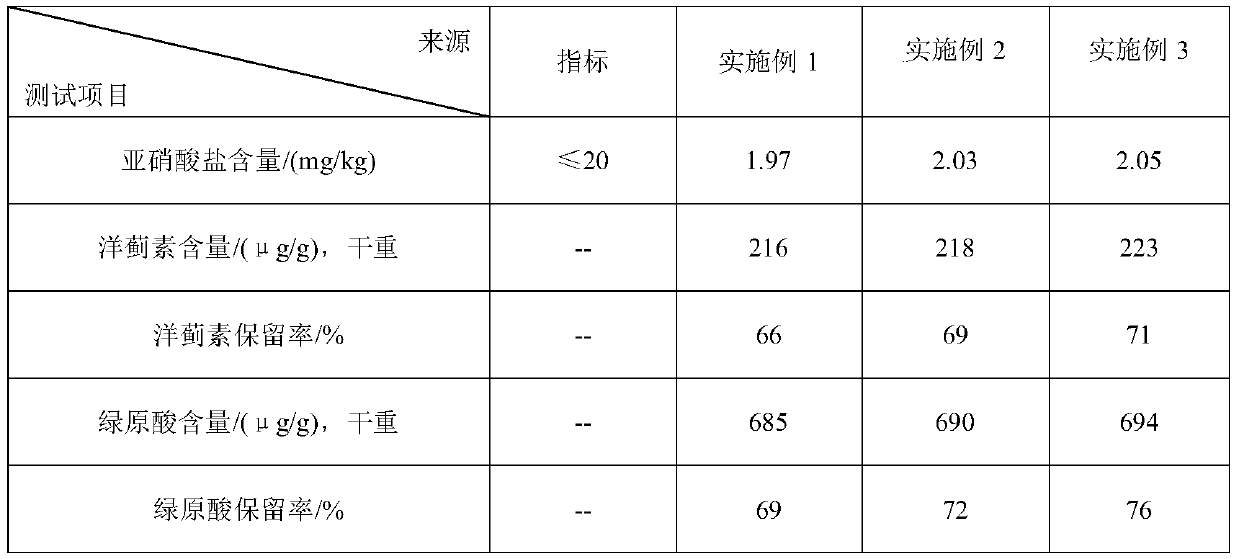How to prepare artichoke pickles
A technology for artichokes and pickles, which is applied to bacteria used in food preparation, the function of food ingredients, and food ingredients as taste improvers, etc., can solve the problems of large specific gravity, low utilization rate, low retention rate, etc. Reduced taste, improved acceptance, improved mouthfeel
- Summary
- Abstract
- Description
- Claims
- Application Information
AI Technical Summary
Problems solved by technology
Method used
Image
Examples
Embodiment 1
[0025] The preparation method of artichoke pickle, concrete steps are:
[0026] A. Raw material pretreatment: Wash 100kg of artichoke bracts, blanching at 75°C for 1min, drain the water, and cut into slices with a thickness of ≤2cm;
[0027] B. Pickling: Add 5kg of salt to the sliced artichokes and marinate for 10 hours, and dry the pickling solution;
[0028] C. One-time inoculation: insert 0.5kg plantarum lactobacillus into the pickled artichoke, mix well;
[0029] D. Primary fermentation: statically ferment at 30°C for 12 hours;
[0030] E. Second inoculation: Take the fermented artichoke and mix it with Aspergillus oryzae to make the inoculation amount reach 10 6 spores / g artichoke (artichoke after primary fermentation);
[0031] F. Secondary fermentation: leave the artichoke after secondary inoculation to ferment at 25°C for 3-9 days, and stop the fermentation when the artichoke is obviously softened and produces a strong sauce aroma, and the artichoke pickle is obta...
Embodiment 2
[0034] The preparation method of artichoke pickle, concrete steps are:
[0035] A. Raw material pretreatment: Wash 100kg of artichoke stems, blanching at 85°C for 3 minutes, drain the water, and cut into strips with a thickness of ≤2cm;
[0036] B. Pickling: Add 15kg of salt to the sliced artichokes and marinate for 2 hours, and dry the marinade;
[0037] C. One time inoculation: insert 5kg plantarum lactobacillus into the pickled artichoke, mix well;
[0038] D. Primary fermentation: leave it to ferment for 48 hours at a temperature of 30°C;
[0039] E. Second inoculation: Take the fermented artichoke and mix it with Aspergillus oryzae to make the inoculation amount reach 10 6 spores / g artichoke (artichoke after primary fermentation);
[0040] F. Secondary fermentation: leave the artichoke after the second inoculation to ferment at 30°C for 3-9 days, and stop the fermentation when the artichoke is obviously softened and produces a strong sauce aroma, and the artichoke pi...
Embodiment 3
[0043] The preparation method of artichoke pickle, concrete steps are:
[0044] A. Raw material pretreatment: Wash 100kg of artichoke bract stems, blanching at 81°C for 2 minutes, drain the water, and cut into strips with a thickness of ≤2cm;
[0045] B. Pickling: Add 8kg of salt to the cut artichokes and marinate for 6 hours, and dry the marinade;
[0046] C. One-time inoculation: insert 2kg plantarum lactobacillus into the pickled artichoke, mix well;
[0047] D. Primary fermentation: statically ferment at 36°C for 36 hours;
[0048] E. Second inoculation: Take the fermented artichoke and mix it with Aspergillus oryzae to make the inoculation amount reach 10 6 spores / g artichoke (artichoke after primary fermentation);
[0049] F. Secondary fermentation: Leave the artichoke after the second inoculation to ferment at 38°C for 3-9 days. When the artichoke is obviously softened and produces a strong sauce aroma, stop the fermentation to obtain the artichoke pickle .
[0050...
PUM
 Login to View More
Login to View More Abstract
Description
Claims
Application Information
 Login to View More
Login to View More - R&D
- Intellectual Property
- Life Sciences
- Materials
- Tech Scout
- Unparalleled Data Quality
- Higher Quality Content
- 60% Fewer Hallucinations
Browse by: Latest US Patents, China's latest patents, Technical Efficacy Thesaurus, Application Domain, Technology Topic, Popular Technical Reports.
© 2025 PatSnap. All rights reserved.Legal|Privacy policy|Modern Slavery Act Transparency Statement|Sitemap|About US| Contact US: help@patsnap.com

